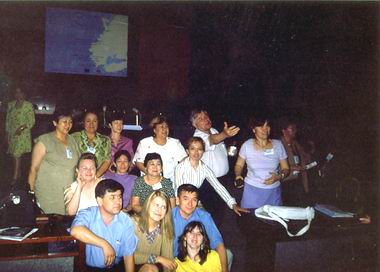Русская
версия
“Civic
Engagement
Policies of the World Bank and the
European Bank for Reconstruction and Development in the Russian
Federation”
Research project
description
Problem
statement
Special
formal and informal
policies of the WB and EBRD set and institutionalize the process of
civic
engagement in Russia.
These policies are meantto make the principles of public
participation open
and clear, which, in turn, should contribute to greater public
awareness,
understanding and support for social and economic development and
reforms, as well
as
provide feedback to policy-makers.
At the end of
the year 2003 the World Bank
(International Bank for Reconstruction and Development and
International
Development Agency) portfolio in the Russian Federation included 33
projects
and 3
grants, which together amount to USD 9,7 bln of net obligations
of the
World bank for the Russian FederationGovernment. The
mechanisms of the WB's interaction with
the Russian Government include loans for the implementation of projects
and
programs, production of
analytical reports, and consulting. The World bank supports
education, tax, pension, legal
and other
reforms, including the structural adjustment of the Russian economy
aimed at
poverty reduction.
As of the
end of
2002
the European
Bank for Reconstruction and Development invested EURO 4,9 bln in Russia
in the
form of direct and regional investments in such projects as the
creation of credit
lines to the
Russian banks, the development of industry and corporate
governance
codes, and a program to restructure existing monopolies, construction
of
dam,
etc.
Research hypothesis
Social
and
economic reform policies in Russia including those
implemented
with the financial support and/or advice of the WB and EBRD, will be
more
successful
if the various interested parties are more
actively
engaged in
their
design, development, implementation and evaluation.
The civic engagement policies of the above-mentioned international
institutions and the
Russian Government will reach their goals more efficiently if they
combine their strengths in order to develop better individual policies
specifically devoted to the issue,
which will then be followed by practical implementation.
Project tasks
In the
course
of research I plan to carry out the following tasks:
- Refine
the definitions of the
formal and informal
elements of the
civic engagement policies of the Word Bank Group and the European Bank
for
Reconstruction and Development in Russia.
- Fully analyse the the WB and EBRD civic engagement
policies and their implementation from the beginning of their
operations in the Russian
Federation
in 1991 untill 2004.
- Compare civic
engagement
policies of the WB and EBRD on some of the following parameters:
- Level of
officials who
initiated and worked on the development of civic engagement policies;
- Principles of
openness in
the development and amendment of civic engagement
policies;
- Links between
the civic
engagement policies and other policies and strategies of the WB and
EBRD, for
example between the WB Information Disclosure Policy, WB Country
Assistance
Strategy, EBRD Country Strategy;
- Link between civic engagement of the WB and EBRD and the
approval
of their projects
and
programs by the Russian people.
- Refine the criteria for
successful and non-successful
implementation
of civic engagement policies of the WB and EBRD from the point of view
of
democratic participatory approaches of their development, openness and
accountability of state and inter-state institutions, active
citizenship,
public participation and inclusion of various (including marginalized)
segments of the population in planning, decision-making, and monitoring
implementation by the Government.
- Draw
conclusions on the
best practices and refine recommendations regarding successful
strategies for
the development and implementation of civic engagement policies of the
WB
and EBRD, together
with the Government of the Russian Federation.
Research Problems
- Principles
of
development
and implementation of civic engagement policies of the WB and EBRD in
Russia
and
criteria of their effectiveness;
- Influence of
public
participation on the WB and EBRD projects and programs in Russia
and their successful
implementation
- Link
between the civic
engagement policies of the WB and EBRD and that of Russian federal
Government
and Russia’s
regions
.
Project
methodology
In
general,
the research methodology is
based on empirical, mostly qualitative data (based on the concept of
positivism). Within
the framework of positivism, a behavioralist approach and
descriptive-induction
method are chosen. Institutional analysis is also applied. Furthermore,
the
research is oriented towards the possible practical use of its
results and
conclusions and may be replicated for other international institutions
and/or
countries.
In
the
course
of the project the following research methods are to be used:
- Analysis of
institutional WB and EBRD documents
(policies, strategies, operational directives, etc.) of the WB and EBRD;
- Interviews with senior
WB and EBRD managers and specialists to learn
more about implementation of their civic
engagement policies Russia;
- Study of data from publicly
available opinion polls about the perception of WB and EBRD projects
and
programs
in Russia
(how do people understand them, do they feel the benefits, do they
approve of
these projects, etc.)
- Interviews with a number of civil society organizations (NGOs,
labor
unions,
etc.) which either engaged or opted not to engage (provided they had
information on existing opportunities) with
the WB
and EBRD in Russia’s
various regions. Outline case studies.
Research
results
The
final product of the research will be a
20-page
policy paper destined for the project target groups - decision-makers
at the WB, EBRD and Russian Federal Ministries.The policy paper with research findings will
be presented to the target groups in the form of a special
publication,
containing recommendations on how best to achieve for civic engagement
in the
process of policy reforms and social and economic development programs.
Back to Home Page
